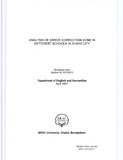| dc.contributor.advisor | Choudhury, Shaheena | |
| dc.contributor.author | Islam, Morshada | |
| dc.date.accessioned | 2010-09-19T03:11:52Z | |
| dc.date.available | 2010-09-19T03:11:52Z | |
| dc.date.copyright | 2007 | |
| dc.date.issued | 2007-04 | |
| dc.identifier.other | ID 03103012 | |
| dc.identifier.uri | http://hdl.handle.net/10361/87 | |
| dc.description | This thesis is submitted in partial fulfillment of the requirements for the degree of Bachelor of Arts in English, 2007. | |
| dc.description | Cataloged from PDF version of thesis. | |
| dc.description | Includes bibliographical references (page 27 - 28). | |
| dc.description.abstract | Though error correction is considered to be the integral part of language teaching unfortunately, in our country, in most of the educational institutions, error correction is considered to be the most negligible part. Extensive research on error correction shows that learners construct their L2 from teachers' response so it is essential to provide a suitable feedback to the learners. The present study investigates how error correction is done at elementary level in different schools in Dhaka city and learners' response to the treatment of error. We know that teachers correct oral mistakes through speech, but not how and what types of errors are corrected in class. Also, to what extent it is done is of great significance, as it requires a great deal of sensitivity on the part of the teachers. The objective of the research was to probe into different classrooms and find out if the teachers were aware of the changing trend in teaching methodology of doing error correction and trying to encourage learners to become fluent in the spoken language. The research participants were the teachers and students of elementary level of different classrooms in a number of schools. The findings revealed that grammatical and content errors were treated most frequently but grammatical error treatment was done specifically in Bengali medium schools. In classrooms it was observed that teachers use a variety of techniques for error correction and providing feedback but most of the treatments were done by the teachers unintentionally, not knowing any theories and strategies of doing error correction. The paper ends with the suggestion that teachers should know about the techniques of error correction they use and should be aware of the effective ways of giving corrective feedback because correcting all the time during oral work will inhibit the learners. | en_US |
| dc.description.statementofresponsibility | Morshada Islam | |
| dc.format.extent | 41 pages | |
| dc.language.iso | en | en_US |
| dc.publisher | BRAC University | en_US |
| dc.rights | BRAC University thesis are protected by copyright. They may be viewed from this source for any purpose, but reproduction or distribution in any format is prohibited without written permission. | |
| dc.subject | English and humanities | |
| dc.title | Analysis of error correction done in different schools in Dhaka city | en_US |
| dc.type | Thesis | en_US |
| dc.contributor.department | Department of English and Humanities, BRAC University | |
| dc.description.degree | B.A. in English | |

